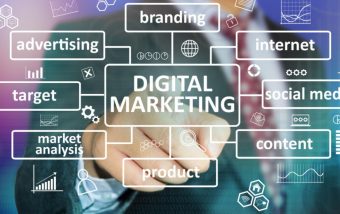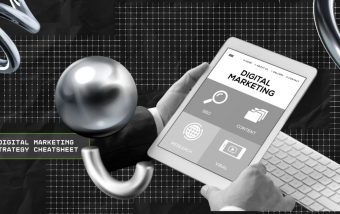Real Estate Link Building That Actually Works: Earn Local Authority, Rankings, and Better Leads Without Spam
Dec 10, 2025

Dec 10, 2025

Dec 10, 2025

Dec 09, 2025

Dec 09, 2025

Dec 05, 2025

Dec 05, 2025

Dec 04, 2025

Dec 04, 2025
Sorry, but nothing matched your search "". Please try again with some different keywords.

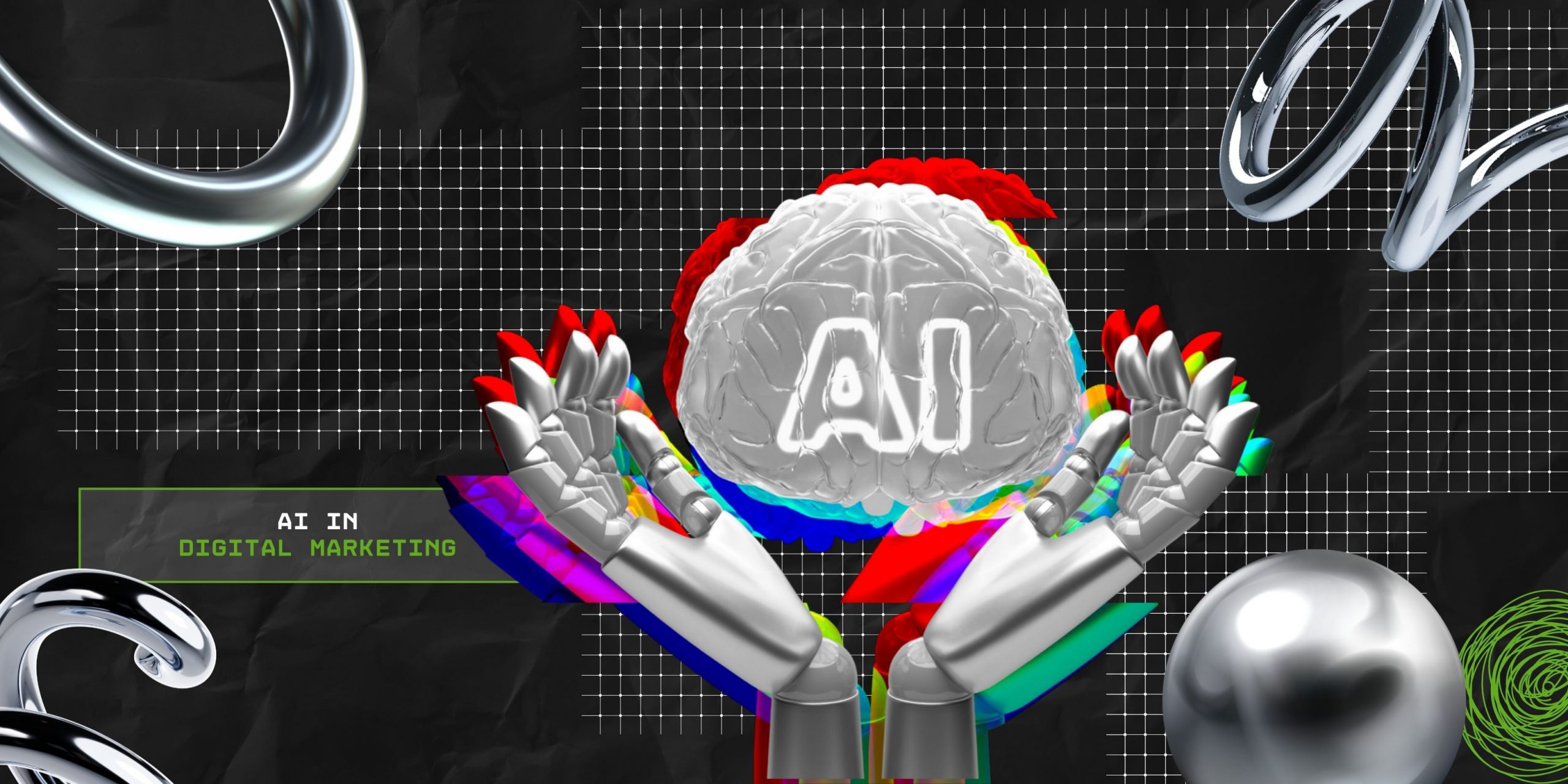
It is not new how AI technology’s evolution has drastically transformed the realm of digital marketing.
With every new model and tech-based marketing approach, AI now stands out as a game-changing element for digital marketers.
Moreover, it provides dynamic support in digital marketing. That is, from driving personalized marketing campaigns to predicting audience behavior, it literally does it all.
As a result, more and more marketing professionals are incorporating AI into their digital marketing strategies. As the report from the Digital Marketing Institute points out—
“Marketing leaders are implementing AI-driven initiatives in their marketing strategies with many believing the technology will have a ‘big impact’ on productivity (50%), efficiency (45%), and innovation (38%), according to our ‘2024 Global Digital Skills & Training Report: Insights from Corporate Leaders’ report”.
In addition to this, AI’s incorporation helps automate routine tasks, reduce time in content marketing, and gain data-driven insights. That is, accelerating the decision-making process and revenue growth simultaneously.
But the real question is— “How to use AI in digital marketing?”
And that’s exactly what I am going to delve into in today’s blog. Here, I will be discussing the diverse aspects of using the AI-driven digital marketing strategy, focusing on—
Stay tuned!
First things first, AI in digital marketing refers to the utilization of the core competencies of AI technology for boosting marketing efficiency.
That is, it indicates how marketers use AI for data collection and predictive analysis. So, it is easier to make data-driven decisions and automate various marketing tasks.
Moreover, AI tools provide insights about customer preferences, behavior, and their immediate needs by analyzing large volumes of user data. So, marketers can use the information to modify their approach or strategy.
In addition to this, AI promises great opportunities for digital marketing campaigns. That is, it helps brands to create personalized campaigns and provide relevant content for marketing.
So, it becomes easier to predict the future consumer behavior and modify the campaigns accordingly.
Apart from simply using AI tools, involving it in the marketing strategy can dynamically improve the overall efficiency.
That is, it can optimize campaigns, enhance the efforts, and side-by-side improve audience engagement. So, marketers can literally use an AI strategy to achieve real business objectives.
But unlike the traditional marketing strategies, the AI-driven strategy focuses on mapping out how the technology should be incorporated.
So, here are the steps to create a proper AI-driven digital marketing strategy—
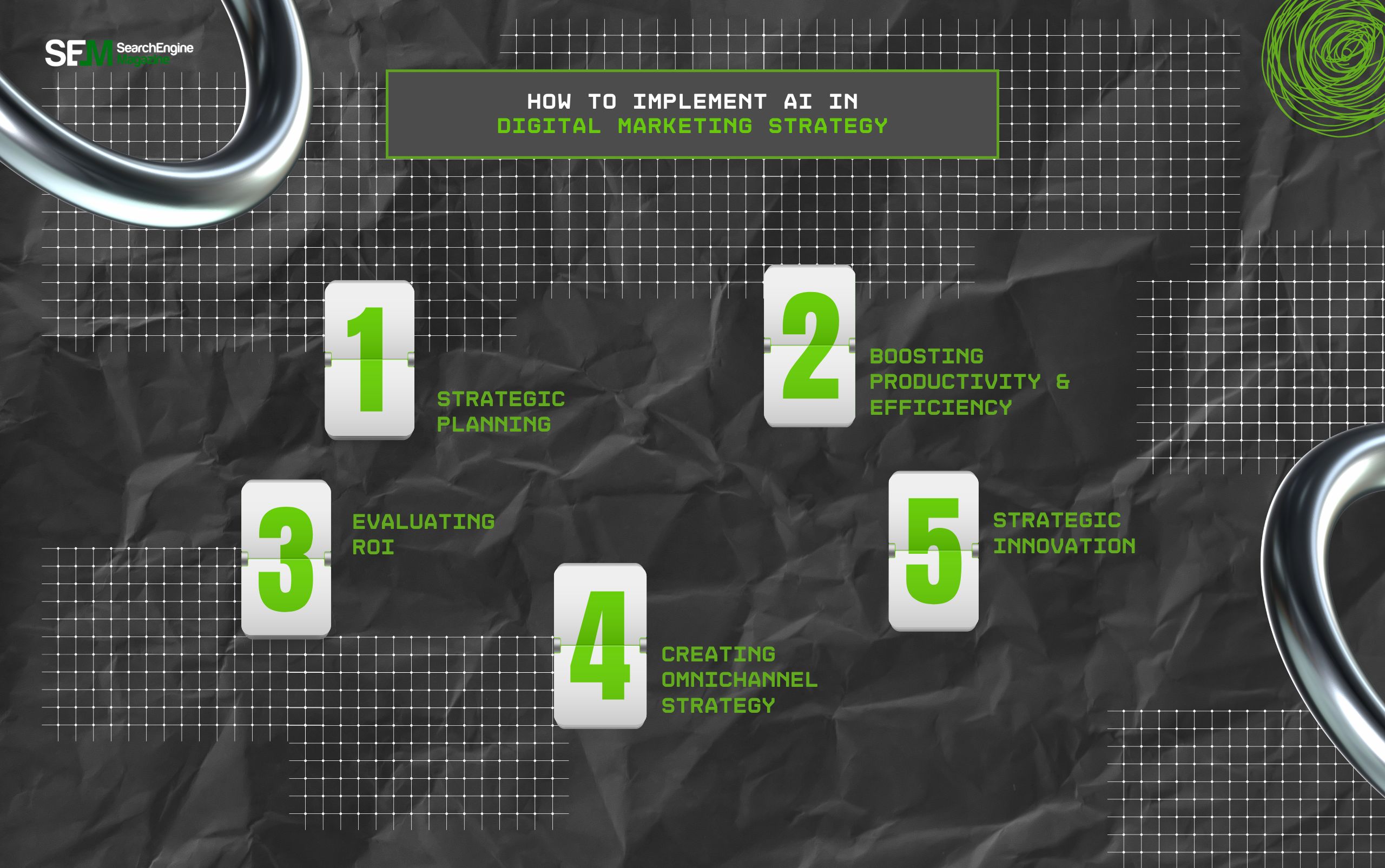
Given that the incorporation of AI dynamically enhances the digital marketing strategy, here’s how to implement it the right way.
Firstly, AI tools can be implemented for strategically planning the marketing approach. That is, with the help of AI tools, marketers can conduct market research to identify opportunities and risks.
And, based on the insights, they can use Generative AI to draft a comprehensive strategy. So, they can have a detailed strategic report from the data analysis.
AI tools can also help boost the overall productivity and efficiency of the marketing approach. For instance, these tools can be used to automate routine tasks and content creation for brands.
Moreover, the AI insights can help in tailoring the brand messages and campaign slogans that directly impact customer engagement. So, marketers can improve the engagement and conversion rate with the AI’s incorporation.
Since measuring the KPIs and ROI helps in deciding whether the strategy should be implemented or not, AI tools can be used to evaluate them.
Moreover, they provide accurate results after analyzing the performance metrics and predict future ROI for a strategic campaign. So, brands can use this information to make informed decisions, set a budget, and optimize the processes.
Since digital marketing encompasses diverse media channels, knowing where the brand campaigns will perform positively is vital. That’s where the AI tools can provide powerful support.
They can analyze multiple channels to provide a holistic overview of the customer behavior on different platforms. So, brands can choose the right platform to launch their promotional campaigns.
In addition to this, the tools provide real-time data about how the campaign is performing. This makes it easier to track the effectiveness of the strategy and find out areas that need improvement.
Just like any marketing strategy becomes redundant over time, a single AI strategy can become ineffective after some time. So, brands need to constantly update their strategy with new tools and innovative ideas.
This way, they can stay ahead of their competitors in the market. And, use trending AI models to improve their content performance.
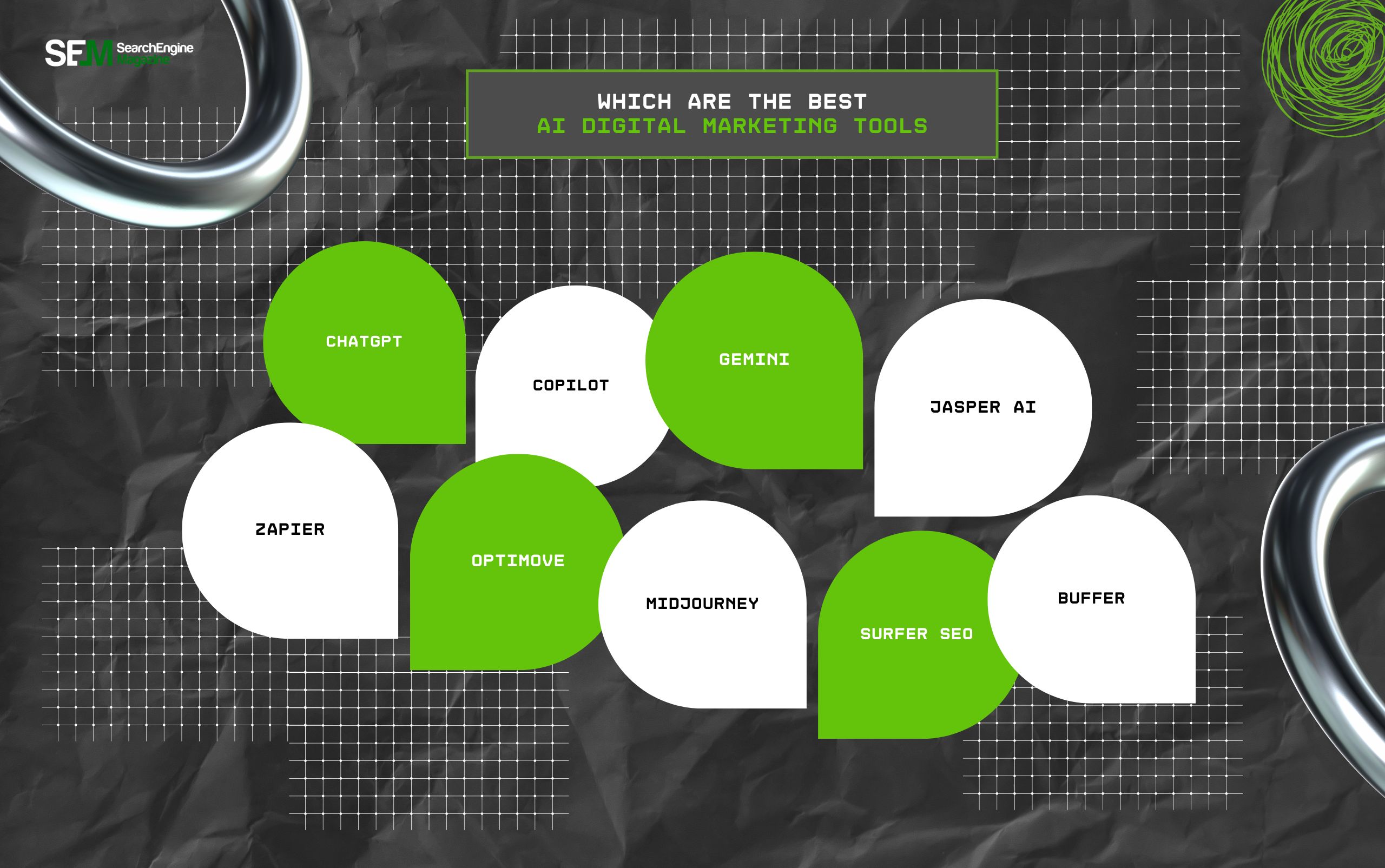
Marketers are readily using AI tools to make informed decisions, automate repetitive tasks, and streamline the workflow.
So, here are some of the best AI digital marketing tools that offer a centralized platform for market analysis, campaign management, and predictive modeling.
Just like any emerging technology, AI in digital marketing comes with a set of benefits and challenges. So, here is a clear breakdown of its pros and cons—
| Pros | Cons |
|---|---|
| 1. Boosts productivity by automating routine marketing operations. | 1. Potential of providing biased results if the data is not diversified. |
| 2. Improves the efficiency of the strategy by streamlining the processes. | 2. Mistakes or inaccuracies in analytics due to incorrect data inputs. |
| 3. Provides real-time insights on performance, ROI deliveries, and customer engagement. | 3. Prone to data breaches and digital threats. |
| 4. Creating and optimizing quality content creation for multiple digital channels. | 4. Lack of transparency with the AI models’ work. |
| 5. Predicts future customer trends based on the historical consumer data. | 5. Ethical issues with user data collection. |
As the adoption of AI in digital marketing is slowly becoming normal, here are some expert opinions about this change.
According to the report from Forbes, AI adoption can be beneficial in many ways—
“AI-powered recommendation engines, like those used by Amazon and Netflix, analyze users’ past behaviors and preferences to suggest products or content they are likely to enjoy. This not only enhances user satisfaction but also increases conversion rates and customer loyalty”.
Additionally, the research from HubSpot highlights the rapid adoption of AI—
“Our 2025 research found that text-based content creation leads the way, with 55% of AI-using marketers relying on it for blogs, emails, and social posts. Research follows closely behind at 47%, including market research and article summarization, while 41% use AI for automating direct brand messaging and conversational marketing”.
Moreover, the article from Harvard University shows how predictive AI models can help marketers to enhance customer experience—
“The models use machine learning and statistics to extrapolate historical data and forecast future events, allowing marketers to analyze consumer behavior and market trends to inform campaigns and strategies and stay ahead of the competition”.
Even in Reddit, users comment on AI’s adoption in digital marketing—
“I can assure you AI is not replacing digital marketing. It’s just going to enhance it. Business owners still don’t have the time to do it themselves”.
AI’s capability to process large volumes of data and provide insightful reports makes it the perfect companion for marketers in the digital marketing realm.
Moreover, the current AI tools can easily simplify the time-consuming marketing processes through automation, prediction, and content creation.
So, naturally, there is a high possibility for AI to evolve its influence in digital marketing in the future.
In addition to this, as the AI tools evolve, brands will be able to create more personalized campaigns and make informed decisions. Taking audience engagement to the next level.
So, if you haven’t tried any of these AI digital marketing tools, it’s high time to try them out. Just choose one and skyrocket your marketing game today!
Here are some of the common questions around the incorporation of AI in digital marketing.
There are countless ethical and regulatory concerns around the incorporation of AI in digital marketing. Some of these include—
» Data privacy and security with large volumes of datasets.
» Biased results and artificial discrimination due to non-diversified data.
» Lack of transparency in the processing behind the algorithms.
» Issue with overpersonalization, leading to manipulative recommendations.
Yes. Brands can easily balance the use of AI and human-generated content by taking a few effective measures—
» Using AI tools to provide personalized content to customers.
» Implementing the tools ethically in the marketing strategy.
» Focusing on providing the human touch to the content by sharing real user stories.
» Disclosing how AI is being used for marketing approaches in the company.
To use AI technology responsibly, marketers need to adopt a few measures. So, some of these responsible practices include—
» Being transparent about how the user data is being used by the AI models.
» Prioritizing human monitoring and oversight while handling AI-driven strategies.
» Seeking user feedback and customer reviews to better understand the concern and modify the strategies accordingly.
Yes. Since AI models collect information from diverse internet sources, they can sometimes generate content with misinformation. Moreover, they can spread false information using advanced technology to manipulate the audience. So, it is better not to blindly trust the AI content.
Barsha is a seasoned digital marketing writer with a focus on SEO, content marketing, and conversion-driven copy. With 7 years of experience in crafting high-performing content for startups, agencies, and established brands, Barsha brings strategic insight and storytelling together to drive online growth. When not writing, Barsha spends time obsessing over conspiracy theories, the latest Google algorithm changes, and content trends.
View all Posts
Real Estate Link Building That Actually Works...
Dec 10, 2025
Why Health-Conscious Consumers Choose Blockch...
Dec 10, 2025
How To Buy Xupikobzo987Model? Decoding The Mo...
Dec 09, 2025
Workplace Management EWMagWork: Is This Smar...
Dec 09, 2025
Social Media Stuff EmbedTree: Is This Digita...
Dec 05, 2025